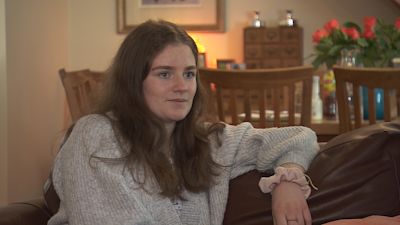'It feels like you're on fire' - Teen with tic shares what it's like to have attack

Watch ITV Cymru Wales' report by Ellie Pitt
A teenager has described what it feels like to have 'horrible' tic attacks, during which "it feels like you're on fire".
Issie Sayers's tic began in November 2020 with her neck jolting before other involuntary movements, noises and swearing followed.
The 17-year-old said: “I felt really self conscious and embarrassed because I didn’t want people to ask me why I was doing movements and everything, when I couldn’t control it and I didn’t know why.”
Issie, who lives in Neyland, Pembrokeshire, has autism and anxiety, which she believes was made worse during the pandemic and could be behind the start of her tics.
She also experiences severe, seizure-like, tic attacks: “It feels like you’re on fire almost your whole body’s on fire and you can’t cool it down.
"Everything’s just moving and the urges and the feelings they won’t go away no matter how how many times you tic and it’s just so horrible.”
Usually patients have tics for a year before they are diagnosed with tourettes, for Issie that 12 month period is approaching.
The teenager says she used to try to “hide and suppress” her tics because was “ashamed and embarrassed” by them and she did not want tourettes to be her “full personality”.
“I didn’t want them to see me as Issie with tourettes I wanted to be seen as Issie who has a dog, who likes make-up, who enjoys being with her friends.”
Tic and tourettes experts at Great Ormond Street Hospital in London have recorded a rise in the number of children and teenagers who are experiencing tic symptoms and tic-attacks in the wake of the Covid-19 outbreak.
Dr Cara Maiden is a consultant child and adolescent psychiatrist at the Princess of Wales Hospital in Bridgend, where they have had a 200 per cent increase in the number of children and teenagers being referred with tic disorders.
“Over the summer I have seen a young person presenting a severe tic disorder every week, that’s unprecedented for us.”
When asked what she thinks is behind the rise in cases, Dr Maiden replied, “I don’t think we can underestimate the impact of the pandemic on children.
"We've seen young people with very high levels of anxiety, their social groups, peer groups and education has changed beyond all recognition. Children are still trying to adjust to the new world.”
Helen Reeves-Graham’s daughter started to tic in August last year, her symptoms also started with a neck jerk.
Helen said the tics have been life-changing and are now so severe and unpredictable that the family have to take a wheelchair out with them in case her daughter has a drop-tic, where her legs go weak and she is temporarily unable to walk.
And Helen says accessing specialist health services in Wales has felt almost impossible.
She says she has faced a lack of expert knowledge of tics and tourettes in children and felt so lost that she decided to start a Facebook group to connect with other parents.
The numbers grew quickly as members exchanged similar experiences around difficulties getting seen by doctors and being referred to different services depending on where in Wales they lived.
Helen has started a petition calling for more support for young people with tics and tourettes. If it gets enough signatures it will be discussed by politicians in the Senedd.
Her campaign is asking for:
a clear, clinical referral pathway for those who go to their doctor with tics
a childhood tic and tourettes expert everyone can access in Wales regardless of their postcode
tourettes clinics
A Welsh Government spokesperson said: “We are committed to ensuring all children with a neurodevelopmental condition, including tics, can access the services and care they need. Regional Partnership Boards are rolling out a new framework to improve access to the right support.
“As pressures on assessment and support services continue to increase, we are reviewing all children’s and adults neurodevelopmental services, to identify where there are gaps in provision and the demand, capacity and design of services for children, young people and adults. This work is due to be completed by March.”
You can get more information and advice about tourettes here.